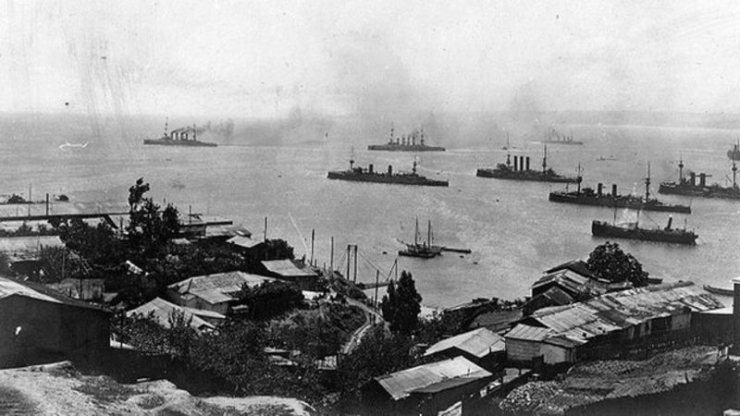1.11. 1914 Battle of Coronel
Categories: First World War , Calendar

At the naval battle of Coronel, the Germans defeated the British.Vice Admiral Maximilian von Spee forced the enemy to use their superior ship speed and betterwith their ships looming on the horizon against the setting sun, and then he simply shot his opponent.
The Imperial Navy had a number of small squadrons in the oceans around the world that were virtually unable to compete with the Royal Navy and return to Germany. These squadrons therefore tried in all parts of the world to do as much damage as possible to the Allied interests before their inevitable destruction. The most powerful German squadron was commanded by Admiral Count Maximilian von Spee.
"He moved his squadron, led by the armored cruisers Scharnhorst and Gneisenau, from Qingdao in China to the Chilean coast to lie in wait for Allied supply ships. Aware of the threat Spee and his ships posed, the British ordered their South American fleet under Admiralla Christopher Craddock to block Spee's access to the Atlantic," writes Andy Wiest in his book A Pictorial History of the First World War.
The courageous Craddock, whose forces were much weaker, decided instead to go into battle with the German fleet before reinforcements arrived. This he did on 1 November 1914, when he encountered Spee's squadron off the Chilean coast near the Coronel Islands. Spee forced the British, with their superior ship speed and superior armament, into a disadvantageous position with their ships looming on the horizon against the setting sun, and then simply shot his opponent.
The two British cruisers broke up and sank with all sailors on board, a total of 1,600 men including Craddock. The Germans suffered no casualties and their ships were not damaged. Two British ships managed to escape, but the Battle of Coronel was still a disaster for the Royal Navy.
Spee refuelled and decided to cross the Atlantic to the African coast. But the British had learned from their recent defeat. "On 11 November they sent a much stronger squadron under Admiral Doveton Sturdee to the Falklands and the South Atlantic. Spee rounded Cape Horn in December and decided to attack the undefended Port Stanley in the Falklands before crossing the Atlantic," Wiest adds.
And so, on 8 December 1941, the naval battle of the Falkland Islands took place, with the British repaying the Germans for their defeat at Coronel with interest. The Germans lost 2,000 men, while the other side suffered no casualties. Only the light cruiser Dresden managed to escape into the Pacific, but even she did not escape destruction.
Sources.
The article is included in categories: